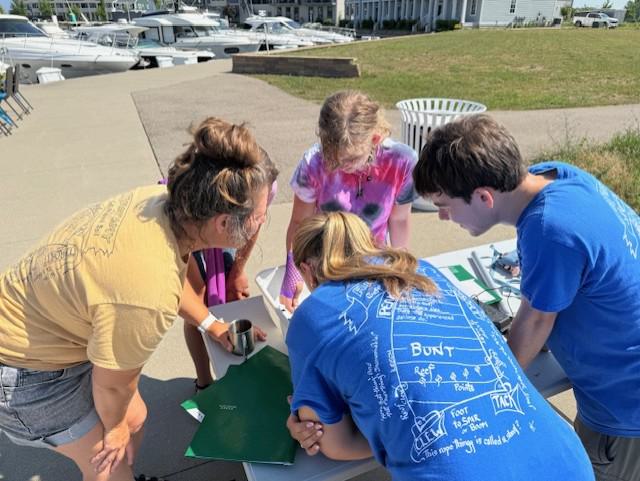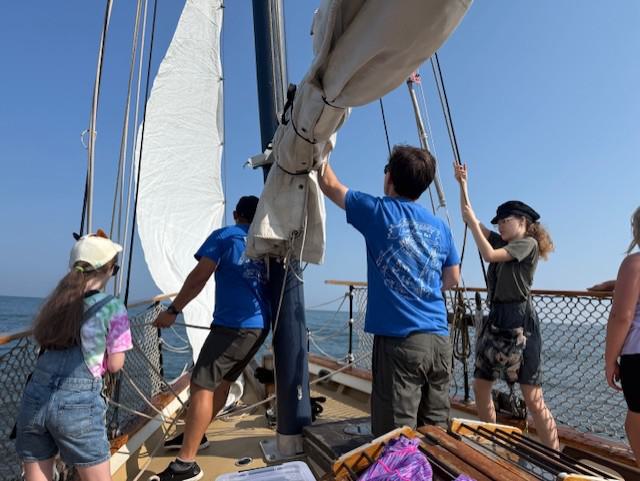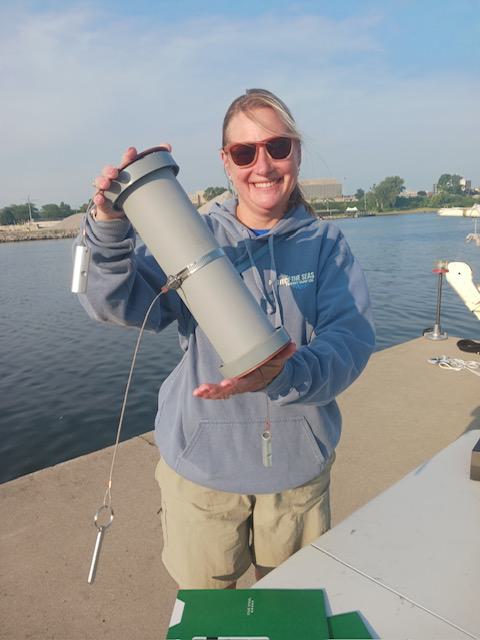TLU Associate Professor of Chemistry Dr. Alison Bray has been known to get out into the field for the sake of science before. As the founder and overseer of Team Rice—the name given to her group of summer student researchers—Bray has sailed the San Marcos River (and the Comal and the Guadalupe) plenty of times, gathering samples to take back to the lab for analysis. But this summer took her to a different body of water—with a very different group of students.

The body of water is Lake Michigan, off the coast of St. Joseph. The students were three different groups of middle schoolers. And their mode of transport? The Tall Ship MJ, a wooden sailing ship, modeled after the workboats from Nova Scotia that were popular about a hundred years ago. (A vintage schooner—as in “hoist the mainsail,” “swab the deck”, and such.) “I led three, half-day science expedition cruises with middle school children,” said Bray. “We conducted water quality assessment experiments on the St. Joseph River and Lake Michigan. We did comparative methods using some old-school and some modern techniques!”
The crew of the MJ, led by Captain Megan, helped the students learn to set sails, take weather readings, and use time-honored techniques, like depth sounding with a weighted lead line—all while doing hands-on science under Bray’s guidance. “This idea was hatched on a windless sunset sail during the MJ's inaugural year, summer of 2023,” Bray recalled. “The MJ is part-tourist sailboat and part-adventure ship. I started talking with Captain Megan and we agreed that sharing science and sailing, along with the history of expeditions, was something we were both passionate about. We both love the historic expeditions, like Shackelton and his disastrous but miraculous adventure in Antarctica.”
Over the next year, the two developed the idea for Expedition STEM, and they ran a test cruise in 2024. This summer, they officially launched the program. “This was our first year to sail with students,” said Bray, who donates her time to the endeavor—as does Captain Megan—as a volunteer. The only costs passed along to the students are to cover the crew. “Our long-range goal is to arrange a scholarship system so that any children in the area or who are visiting could have the opportunity to sail on a science expedition. We advertised locally and caught some traction this year!”

Bray has a long history with non-profit science through programs like the New Braunfels Science Education Foundation and Science Fest—and she’s no stranger to getting out on the water to do research, although the experience of teaching from the decks of a tall ship is a new twist. “My long-ago grad school education involved many ships and deep ocean science, so I'm familiar with open water science techniques,” she said. “I can't say enough about Captain Megan and her willingness to give something like this a try.” And this particular maiden voyage was such a success, there’s definitely more to come. Bray gets up to Michigan for a month every summer with her family, so she’ll be back on deck next year.
Working with middle schoolers offered a fun change, since Bray mostly teaches at the college level. “The students were a lot of fun,” she said. “They asked really interesting questions and were great to work with. They were very excited to get to do some ‘real science,’ and doing science while moving over the waves of the lake made it extra exciting. Even the quietest students who seemed disinterested, as teenagers often do, expressed how much they enjoyed it when we got back to the dock.”

Bray’s favorite thing about the experience is no surprise. It’s the same thing she loves, whether she’s in her lab at TLU or out on some river helping students gather data—the same thing, no matter the age of the students or the setting of the research. “I love to see students light up when they try new things and get involved with real science experiments.”
